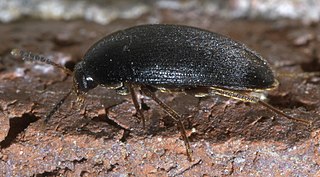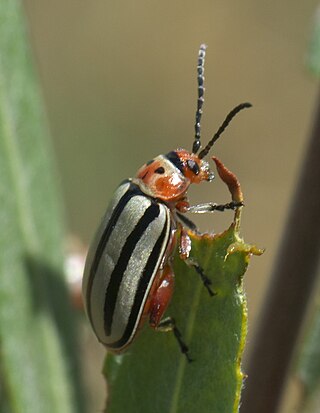
Johan Christian Fabricius was a Danish zoologist, specialising in "Insecta", which at that time included all arthropods: insects, arachnids, crustaceans and others. He was a student of Carl Linnaeus, and is considered one of the most important entomologists of the 18th century, having named nearly 10,000 species of animals, and established the basis for the modern insect classification.

The Heliconiinae, commonly called heliconians or longwings, are a subfamily of the brush-footed butterflies. They can be divided into 45–50 genera and were sometimes treated as a separate family Heliconiidae within the Papilionoidea. The colouration is predominantly reddish and black, and though of varying wing shape, the forewings are always elongated tipwards, hence the common name.

Tetratomidae is a small family of beetles sometimes called polypore fungus beetles. The family consists of several genera, most of which used to be in the family Melandryidae. Tetratomidae can be found worldwide.

Thecla is a genus of butterflies, described by Johan Christian Fabricius in 1807, belonging to the family Lycaenidae. The species are found in the Palaearctic.

Amata is a genus of tiger moths in the family Erebidae. The genus was erected by Johan Christian Fabricius in 1807.

Larinus is a genus of true weevils, comprising about 180 species, mostly in the Palaearctic region with some species introduced to North America. Turkey appears to have a significant diversity of the group, with more than 50 species recorded in the eastern part of the country.

Cantharis is a large genus of soldier beetles in the family Cantharidae with narrow and soft elytra.

Chrysolina is a large genus of leaf beetles in the subfamily Chrysomelinae. Most species are distributed in Europe, Asia and Africa with a small number of species inhabiting North America and introduced species in Australia.

The Acraeini are a tribe of butterflies of the subfamily Heliconiinae in the family Nymphalidae.

Laothoe is a genus of moths in the family Sphingidae first distinguished by Johan Christian Fabricius in 1807.

Melandryidae is a family of beetles in the superfamily Tenebrionoidea. Members of the family are found worldwide, with around 420 species in 60 genera. Larvae and adults are generally associated with rotting wood and wood-decomposing fungi.

Telchin licus, the banana stem borer, is a moth of the Castniidae family. It is native to South America, where it is found from Colombia, Venezuela and the Guianas, throughout the Amazon basin in Brazil and Peru. It has also been recorded as an introduced species in Hawaii.
Castnia fernandezi is a moth in the Castniidae family. It is found in Venezuela.
Castnia invaria is a moth in the family Castniidae. It is found in South America.

Tragocephala is a genus of flat-faced longhorn beetles belonging to the family Cerambycidae.

Disonycha is a genus of flea beetles in the family Chrysomelidae, containing some 170 species in the Nearctic and Neotropics.
Gerdrup, formerly Gjerup, is a manor house and estate located three kilometres north of Skælskør, Slagelse Municipality, Denmark. The estate was from 1760 to 1919 owned by members of the Qvistgaard family and has since then been owned by the Fabricius family. The current main building is from 1866. It is now operated as a venue for meetings, parties and other events.













